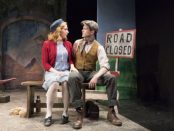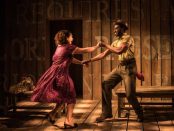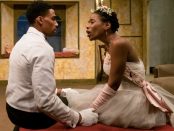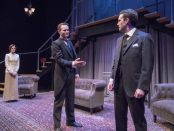Puffs, or: Seven Increasingly Eventful Years at a Certain School of Magic and Magic
The new story concerns Wayne Hopkins, an American boy whose parents die tragically and his Uncle Dave informs him that he is a wizard and must attend a special school in England. Wayne is sorted into The Puffs which he discovers is the house for the losers, rejects and nerds who never win at anything. His one goal is to be a hero at something – eventually – while getting through magic school. There he meets the dashing older student Cedric (Andy Miller) several years ahead, as well as another American, the nerdy math prodigy Oliver Rivers (Langston Belton) who can’t seem to succeed at magic, and Megan Jones (Julie Ann Earls), who wears Goth make-up, all black clothing and resents being there. Megan is particularly angry because her mother is a prisoner and in thrall to the Dark Lord. [more]

































